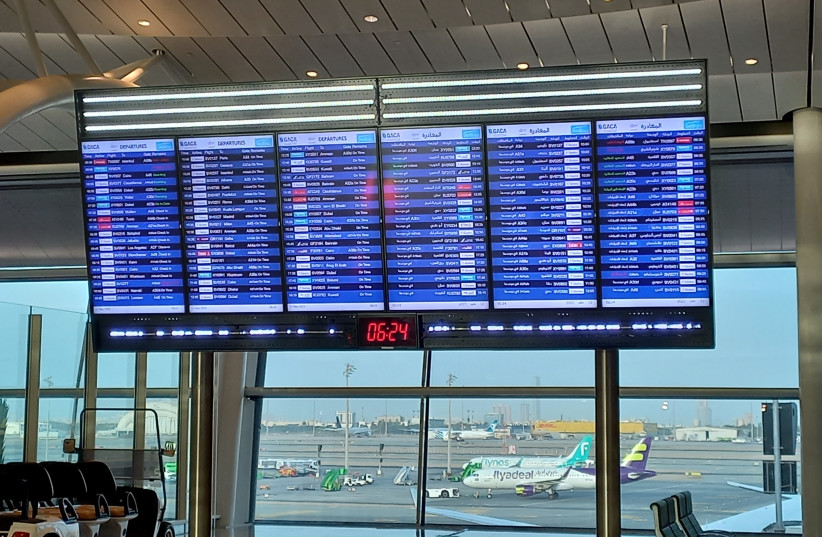Enough with the scaremongering – comment
We awoke on Tuesday morning to another episode of Israelis stranded abroad and the whipping up of collective fear for their safety. This was expressed in the early radio news shows and was clearly manifested by intrepid reporters who unashamedly and needlessly tried to promote panic on the airwaves.
A technical fault forced an Air Seychelles flight ferrying Israelis home from those magical islands in the Indian Ocean to make an emergency landing in Jeddah, Saudi Arabia.
From the description of some of the passengers on board who were interviewed by radio hosts, it appeared as if everything was reasonably calm and under control as the pilots made it safely onto Saudi soil. If they had deemed that an unscheduled landing was required, there must have been good cause to do so to ensure the well-being of the souls on board and the safety of the aircraft.
An electrical fault was apparently the reason why the Airbus A320 airliner, a workhorse of the skies and probably one of thousands flying at any given time, was forced to land.
After assuring listeners that all the Israelis were safe, the local news media proceeded to question passengers how they felt as they found themselves unexpectedly at the airport in what the presenters tried to hint bluntly as being a hostile country.
 Flight board at Jeddah Airport. (credit: Wikimedia Commons)
Flight board at Jeddah Airport. (credit: Wikimedia Commons)I’m the last to criticize others in the news trade, but the call to panic stations in newsrooms of the Hebrew outlets yesterday was ridiculous beyond measure.
Was there any reason to scaremonger and raise tensions just because Israelis – through no fault of their own – were forced to set foot on Saudi Arabian soil? Did editors and reporters at those news outlets think that because the passengers were in a country that does not have diplomatic ties with the Jewish state, Israelis would come to harm? It would have been the same had a Tel Aviv-bound flight from London had been forced to land in Zagreb.
Although by law, Israelis are not allowed to travel to Saudi Arabia, it is not designated as an enemy state. Moreover, there is a desperation to strike up diplomatic ties with the Desert Kingdom, and diplomats and officials both here and in the US are toiling tirelessly to try to make it happen. That the passengers would not be afforded the greatest courtesy and warm hospitality for which the Arab peoples are renowned, was a clear manifestation of unfounded Israeli paranoia.
A glimpse of Jeddah
What is Jeddah like, came a question to one passenger, who answered saying that although it was dark, he could see from the air that it appeared to be a very modern city with lots of skyscrapers. Jeddah is indeed a modern port city and is frequented by many Israelis – those who pass through en route to fulfill the Hajj in nearby Mecca.
Why did the news presenters, from the safe surroundings of their newsrooms, entertain even the slightest hint that there might be some hostility by the Saudis toward the hapless passengers? What possible reason could there be for such a scenario to arise when it is patently clear that both Israel and Saudi Arabia want better relations, and harming innocents could not possibly serve any Saudi interest?
Those with a long memory might recall that in 1977, Mordechai Gur, as IDF chief of staff, warned that when Anwar Sadat’s plane would land in Tel Aviv for his historic first visit to Israel, the doors of the Egyptian president’s plane would fly open and commandos would storm out and spray everybody on the tarmac with bullets, thereby killing off the entire Israeli leadership in one fell swoop. Sadat even quipped to Gur when they shook hands on that very tarmac that his assertion was completely ridiculous, and Israel’s top soldier was left red-faced.
In mitigation, it might be argued that at the time, Gur may have been afflicted by the collective, and possibly personal traumas of the Yom Kippur War and that the wounds that were opened up four years earlier were at the time still nowhere near healed.
Middle Eastern realities have changed in no small measure since Sadat’s first step on Israeli soil 46 years ago. Sadat’s visit was the harbinger of what has become an ongoing rapprochement with Arab states, but it appears, however, that for some, the need to continue fostering and perpetuating paranoia is an attitude that is hard-baked into the desert soil of the region.





Comments are closed.